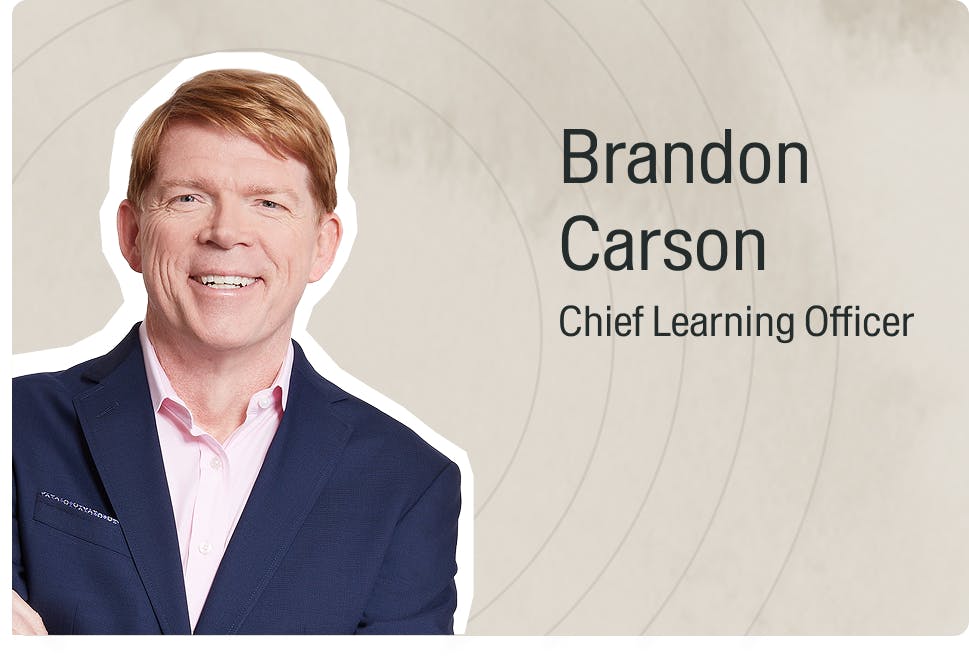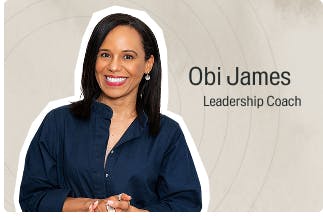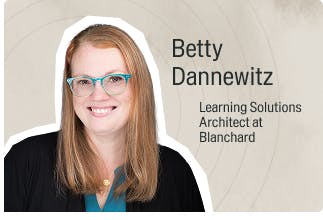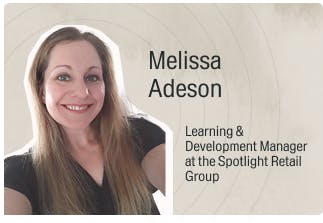Engaging teams in ongoing learning with Jackie Goldberg, Executive Coach & Facilitator
About the guest
Jackie Goldberg is an Executive Coach & Facilitator who is passionate about helping people reach their full potential. Jackie earned her Bachelor of Arts in Psychology from Lehigh University and started her career in Human Resources. Soon thereafter she made her way into Client Success, working with executives at large Fortune 100 companies on their talent strategies. Over the years she has worked at some of the top companies in the tech industry, including Bloomberg, LinkedIn and Degreed, where she gained extensive experience in managing teams and delivering exceptional results.
Jackie received her coaching certification from Accomplishment Coaching in 2018 and was the co-host of LinkedIn’s In the Arena Wisdom Podcast from 2019 to 2021. In 2023, she became an Enneagram Accredited Practitioner and uses the Enneagram – a scientifically validated personality framework – to help her clients gain a deeper understanding of themselves and others.
Throughout her career, Jackie has led transformational workshops in the corporate space and has helped countless individuals with shifting their mindset, finding their authentic voice, building confidence, and achieving their goals. She approaches her work with compassion, genuineness, candor and humor.
Jackie currently lives in Montclair, NJ with her husband Jarrett, son Russell and their dog Penny. She loves spending time outdoors, running, practicing yoga, socializing in the community, making art and reading!
Julia: Welcome to L&D in 20, your go-to resource for all things workplace learning, brought to you by Go1. I'm your host, Julia Nieradka, Manager of Customer Success here at Go1.
Today on the show, I'm very excited to be joined by Jackie Goldberg, an Executive Coach and Facilitator.
Jackie's career began in HR, then moved to Client Success where she worked with executives at Fortune 100 companies on talent strategies. Jackie worked at top companies like Bloomberg, LinkedIn, and Degreed before founding her own organization, Coached by Jackie, to help others grow with clarity, confidence, and authenticity.
Jackie, welcome to the show.
Jackie: Thank you so much for having me and for such a warm introduction.
Julia: No worries. Thank you so much for being here today. In today's deep dive segment Jackie, we're going to discuss, engaging teams along the journey of learning.
What is the biggest misconception that leaders have about engaging their teams in learning from your experience?
Jackie: One of the misconceptions that I see over and over again, that leaders believe they need to have learning in a formal setting. It needs to be a big hoopla, so to speak. You have to schedule an event and schedule a workshop or a session or series of workshops, and those are great. And the one and done workshops are wonderful to get teams engaged in a moment in time.
And for the most part, what I see is that the insights and the energy levels around those workshops last about a week or so. Unfortunately, there's often not a carry through or a pull through, or we don't see it embedded in the learning over time. And so the misconception is that it has to be something big and formal, where in reality learning happens in micro moments, over time, over days, within a day, within an hour. And so that is really at the heart of what I see when it comes to this topic of taking a team along a learning journey.
Julia: So I think you can really make a big splash with a new learning platform. And I know for you, this will be something you would've experienced.
With your time at Degreed, for example, but how can L and D make learning sticky and engaging in the long term?
Jackie: Learning platforms are amazing because they're always there and they're always accessible for when someone wants it or needs it. How do you get someone to want it or need it, and what can L and D do to really make that sticky?
So one thing that is really important is really aligning learning with what the business challenges are or what is just most relevant for the business at that time. You know, for example, I came from the world of customer success and you know, a big skill was empathy, for example, that you need to have as A CSM. So how are you building empathy into the day-to-day of a culture of learning for CSMs? How are you allowing them to bring this skill of empathy into their team meetings, into their one-on-ones, into their relationships with their key stakeholders, like the salespeople, and so aligning what is relevant for a particular business.
Anything that they're facing is what's going to make it much more sticky.
Julia: Absolutely. And I also think that ensuring the customer success team has not only the sense of empathy, but the sense of curiosity to go along with their empathy.
Jackie: 100%. And it goes with all different skills, right? Empathy, we'd say, is more of a soft skill, right?
But if you think about something like relationship building or presentation skills, you want to think about how you are bringing it into the day to day through things that are already existing in the rhythm of the business. For any team, it could be in their team meetings, you know, for example, kicking off a team meeting with what is an empathetic gesture that you took this week and what was the impact of that.
Have people share and, and be in a space where that learning is happening over and over and over again. So you're building that rhythm and that cadence into their day-to-day work. Learning can often be seen as transactional, but truly it is a relational thing. I really believe that when it comes to this topic of embedding, learning into a team, bringing employees on a journey of learning, recognizing that it is a relational thing, allows you to bring learning into things like team meetings leading with peer circles or peer coaching or monthly touch bases with employees who are.
Desiring to learn the same skill and making space and time to have conversations about how you are applying your learning is so critical to making it sticky.
Julia: That's amazing. I really would love to ask you as well, what are some of the practical ways in your opinion, that we can embed learning into day-to-day work, especially in this high pressure target driven environment that a lot of us work in. What are some of the things that leaders can help to do this?
Jackie: It really starts with identifying what each individual needs or wants to work on and and what they want to learn. Again, I think that alignment to what the business needs, but also the alignment to the individual is critical.
You hear the term microlearning all the time, and there's a reason for it, right? Micro learning is moment in time learning where you can use a tool or use a peer to better. Take in or digest information or really at the end of the day, experientially practice what you are putting into place. One of the best ways to do this is to get leaders involved and have leaders be the ones to really lead by example in terms of what they're learning, ensuring that they are sharing with their team what they're learning, how they're putting that into practice, and encouraging others to do the same.
So leaders being on board and not only being on board but really taking the reins of their own learning is only going to make it more sticky for others. I think practically speaking, in order to make something part of a journey, you have to have those milestones in place. And so having, you know, monthly check-ins, quarterly team meetings where you're reviewing what the training was or that workshop that you did two months prior. And one of the most important things is for a team specifically, but even for an organization, is having a common language.
So I'll give you an example here, because in my work, one of the tools that I use is called the Enneagram.
It's a personality assessment. I see you nodding. So I, I think that you're someone who knows the Enneagram, and for those people who know it, it's just wonderful and I just have a smile on my face every time I'm talking about it. But it really helps you understand your motivation behind your behaviors. I.
I use it with teens to help them understand more about themselves and build a level of self-awareness, but also to help understand others and also build a level of compassion for how other people operate. The reason I bring this up is because one of the benefits of using something like the Enneagram, but it doesn't have to be the Enneagram, is having a common language that a team can refer to.
So over time, they have a foundation of a language that they can lean on in times of tension or conflict in times of miscommunication or distrust. And so it helps almost normalize a team because you're all coming from the same place and knowing where that place is because you were trained on it.
And so having a common language is a really great idea to make something sticky and make it yours, right? Each leader, each team can make a training and take what they want and make it their own. It doesn't have to be a, you know, full on personality assessment, but even just having team norms that you constantly refer back to is a great example of really bringing learning into the fabric of how a team is made up.
Julia: That's fantastic. And which Enneagram are you Jackie by? Can ask.
Jackie: I am a type two, so that is the considerate helper. And Jules, what type are you?
Julia: I am a seven, which is a, an enthusiast, which I'm sure will surprise no one that knows me.
Jackie: I think same here. The considerate helper really does ring true to me.
Julia: I would love to know sort of as a follow up to that question. What role does leadership practically have to play in engaging teams in long-term learning? Because I think we sometimes can think that, you know, going live with the Big Bang new flashy tool that handing people the keys to their learning to self lead is, is enough sometimes. But in your experience, I would sort of love to know what your opinion is on this.
Jackie: I believe that leaders play the most critical role in fostering a culture of learning and keeping it at the forefront in terms of cadence and consistency. Leaders are the people who are putting the meetings on the calendar for the team to get together. They're doing the performance reviews, they're doing the check-ins.
They're hopefully reviewing individual development plans and career development plans on a quarterly basis. And it's really on leaders individually to ensure that they are doing these things that are often seen as secondary to hitting quota or bringing in revenue. At the same time, when you look at it as primary or just as important, you see that there's such a big impact that can be had when there is this cadence and consistency.
Unfortunately, if a leader is not doing that, these things fall by the wayside and so. I do believe it's leaders play a critical role in, in holding all that, and as I shared earlier, leading by example, because no one wants a leader that's going to tout the importance of micro learning or doing things on a daily, weekly basis, but not doing it themselves.
So any leader that can start off a meeting by being vulnerable, sharing what they are experiencing, sharing feedback that they received and what they're doing to, to really work with that feedback. I worked with a team, uh, a little bit ago where we did a round of feedback for everyone, including the leader.
So everyone had everyone give them feedback, and everyone had to give the leader feedback as well. And it was so humbling for the leader to be in that position and receive what may never had been said had, we hadn't, you know, put this together. But really seeing how that leader could embrace feedback and then, and then change, really make some key shifts over the next several months to show that it was something that was so important and that it wasn't going to be taken for granted.
This is another example of when you have frequent check-ins, monthly check-ins on what you're learning. This particular team checked in once a month to make sure that they all were actioning on the feedback that they gave one another, and it came from an incredibly compassionate place, which made everyone just so grateful for the experience and for their own growth that they were getting in the context of the team.
Julia: What an amazing exercise to go through. It sort of sounds like every team should have that experience of going through that with their leader, but I imagine that would take a, you know, an incredibly self-aware and high empathy, high EI team to be able to do that with one another. So that's awesome.
Jackie: Definitely couldn't agree more on both parts.
Julia: Jackie, what are common blockers or resistance points you see when it comes to L and D and how can leaders address those?
Jackie: The first thing that comes to mind, which should not be surprising to anyone, is time. Everyone always says, I don't have the time to do X.
And in today's conversation to learn. You know, I coach so many individuals that are like, I just need to block time on my calendar. I just need to make the time for it. At the end of the day, it truly is what you are doing in the moment. Your awareness around how you are applying what you learned, or how you are practicing, what you learned that is going to make the difference, that's going to make the shift that's going to allow you to grow.
So for example, if you are practicing being a better communicator, getting super clear on what that means, does that mean that you are practicing active listening so that you are not going to interrupt someone and you're not going to. Think about what you're gonna say before they even stop speaking.
Let's go with that example. If you're processing active listening, you don't need to dedicate an hour on your calendar each week to practice that. When you need to practice that is every single moment. Anytime you're on a call, before you get on the call, be intentional about, okay, I'm going on this call and I'm going to do my best to practice this skill that I am working on for myself.
So people say it is time, but truly it isn't. And again, this, I know I'm talking a little bit from an individual level, but it really is, individuals are what make up a team, and teams are what make up organizations. So at the heart of it is people. And so if you can get. People rallied around this concept of truly micro moment learning and finding those critical points throughout your day to do it, that will certainly remove that blocker of time.
Julia: That's incredible. Thank you so much, Jackie.
Now let's get into our next segment, AI at Work, where we dive into how you're using AI at work to work smarter, not harder. How you're helping teams to do the same.
Jackie, you are an executive coach and facilitator. How can learners begin to use AI in their own self-growth journey?
Jackie: The way I see this showing up mostly and in the work that I do as a coach or facilitator, is leveraging AI as a personal coach as a teammate as a helper when you are looking for answers or looking for someone to bounce an idea off of or to help someone coach you through a challenge that you're having. I was actually on with a client yesterday, a one-on-one coaching client, and we are putting together a few development goals based on a 360 that I had completed with her manager and some peers and and so forth to get feedback.
And we discussed her use of AI to help her come up with these development goals, and it was amazing to see how she was able to input what she's working on and her own framework that she likes to use for setting up hierarchical goals and allowing her AI tool to come up with a clear, systemized, well written.
Statement on who she aspires to be as a leader and how she can think about putting these, these goals and then practices to support the goals in place. And it was so uplifting for her. And then of course, having a coach to really dig in and work and speak to the emotional aspect is, you know, huge. But to see that you can really leverage a technology to help in times of challenge or when someone is not there when you need them to be. I think it's a wonderful way for, for individuals to use it.
Julia: Moving into our Future Ready segment where we talk about the future of work and how L and D leaders can prepare themselves and their teams.
Jackie, can you tell us about your take on the future of work? What should L and D leaders be preparing for? Also, what trend are you noticing?
Jackie: You know, the past several years have been really interesting in the way that we work since the pandemic and how much has changed in our virtual nature and hybrid work.
And it's truly a blessing, right? We've seen a lot of good things come from being virtual and having the flexibility to work globally and see people and get work done truly without being in person. A trend that I am seeing is swinging the pendulum a little bit more towards in-person, and not necessarily in-person work, but in-person learning and, and more so getting the teams together in person so that they can have the truly relational learning that we were talking about earlier.
And so what I think L and D leaders need to consider is that. Over the next few years, we're going to start seeing more in-person events, workshops, summits, offsites, and budgets that are putting money aside to make sure that we're bringing people together.
Julia: And now moving into our final segment, the Learning List. What Jackie is your favorite L and D related piece of content or resource at the moment?
Jackie: I'm very into podcasts these days, and I find podcasts that are aligned to my interests and my passions and really what I want to learn about. And so Enneagram is my jam these days, and I love this podcast called Enneagram 2.0 by Beatrice Chestnut and iRANO Paes.
And for anyone who's interested in the Enneagram, it's a really good podcast to get the nitty gritty and learn about it on a professional, psychological, spiritual level.
Julia: That sounds awesome. I'm definitely gonna have to check that one out.
Jackie, thank you so much for joining us on the podcast today. It was fantastic to have you on.
For listeners who wanna get in touch, how can they reach you?
Jackie: You can find me on LinkedIn at Jackie Goldberg or my website, CBJleadership.com. That's CBJ is coached by Jackie. So CBJleadership.com.
Julia: Thank you Jackie. Thank you so much. Thanks for tuning into the show. I'm your host, Julia Nieeadka, and that wraps up another episode of L&D in 20.
To continue the conversation, feel free to reach out to me on LinkedIn, send me a message. The link to my profile on LinkedIn will be in the show notes. Your comments will help us to inform future episodes, and who knows, maybe I'll even answer some of your questions on the show.
We will catch you on the next episode. Until then, keep learning.
This show is brought to you by Go1 the content aggregator for people first, L&D leaders. To learn how to make essential skill development and compliance training the easiest part of your job with a single subscription visit, go one.com or click the link in the show notes and to stay up to date on future Episodes of L&D in 20.
Subscribe wherever you listen to podcasts.
Related Podcasts

Skills Volatility: How leaders can prepare their workforce with Brandon Carson, Chief Learning Officer

Enhancing Succession Planning Through the Art of Letting Go with Obi James, Leadership Coach

Resilient Leadership in Times of Rapid Change with Betty Dannewitz, Learning Solutions Architect at Blanchard

Beyond the Launch: Turning Great Learning Programs into Lasting Engagement Campaigns with Melissa Adeson from Spotlight Retail Group

Train smarter, spend less
Train smarter,spend less
Connect with a Go1 expert to explore the best training options for your organization—no pressure, just solutions that work.